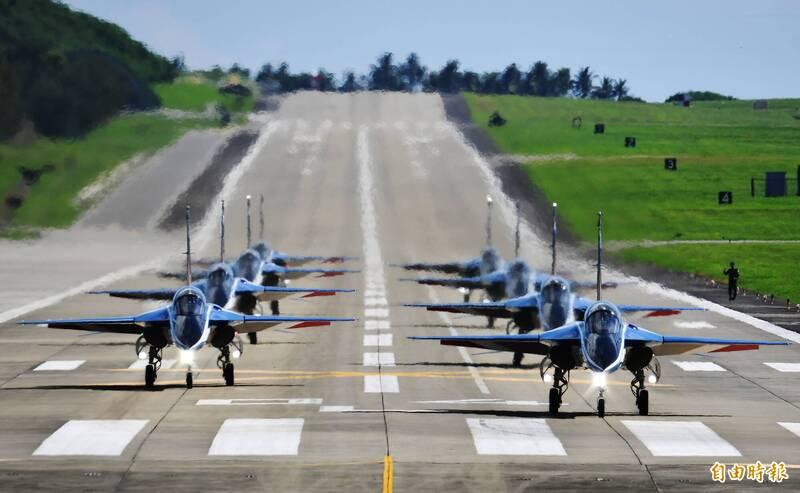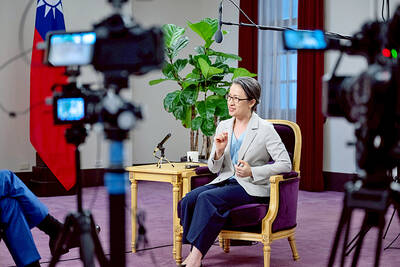The delay in the delivery of a batch of domestically made trainer jets to the air force is due to problems with "external procurement components and systems," the Ministry of National Defense (MND) said in a report sent to lawmakers for review today.
The military's top research unit, the National Chung-Shan Institute of Science and Technology (NCSIST) and government-funded Aerospace Industrial Development Corp (AIDC) are replacing some of the parts ordered externally with components made in Taiwan, the report said.

Photo: Taipei Times
The report was issued to explain to lawmakers why AIDC had only delivered 43 of the 66 Brave Eagle advanced jet trainers to the air force by the end of last month instead of the 47 contracted.
It said AIDC told NCSIST that delivery of the planes was behind schedule primarily because of delays in the shipment of seven "externally bought systems and parts."
The seven parts and systems consist of engines, environmental control systems, canopy protection systems, landing gear, hydraulic tanks, air door actuators and emergency shut-off valves, the ministry said.
AIDC and the NCSIST are now replacing three of the seven — the hydraulic tanks, air door actuators and emergency shut-off valves — with domestically made ones in order to catch up with the delivery schedule.
On the other four systems, AIDC is working with suppliers to have them expedite their shipments, the MND said.
The air force started to receive the domestically made trainers from AIDC in 2021 to replace its aging AT-3 jet trainers.
Aside from the 47 planes to be delivered by the end of last month, the remaining aircraft are scheduled to be delivered in the first half of next year.

China might accelerate its strategic actions toward Taiwan, the South China Sea and across the first island chain, after the US officially entered a military conflict with Iran, as Beijing would perceive Washington as incapable of fighting a two-front war, a military expert said yesterday. The US’ ongoing conflict with Iran is not merely an act of retaliation or a “delaying tactic,” but a strategic military campaign aimed at dismantling Tehran’s nuclear capabilities and reshaping the regional order in the Middle East, said National Defense University distinguished adjunct lecturer Holmes Liao (廖宏祥), former McDonnell Douglas Aerospace representative in Taiwan. If

TO BE APPEALED: The environment ministry said coal reduction goals had to be reached within two months, which was against the principle of legitimate expectation The Taipei High Administrative Court on Thursday ruled in favor of the Taichung Environmental Protection Bureau in its administrative litigation against the Ministry of Environment for the rescission of a NT$18 million fine (US$609,570) imposed by the bureau on the Taichung Power Plant in 2019 for alleged excess coal power generation. The bureau in November 2019 revised what it said was a “slip of the pen” in the text of the operating permit granted to the plant — which is run by Taiwan Power Co (Taipower) — in October 2017. The permit originally read: “reduce coal use by 40 percent from Jan.

‘SPEY’ REACTION: Beijing said its Eastern Theater Command ‘organized troops to monitor and guard the entire process’ of a Taiwan Strait transit China sent 74 warplanes toward Taiwan between late Thursday and early yesterday, 61 of which crossed the median line in the Taiwan Strait. It was not clear why so many planes were scrambled, said the Ministry of National Defense, which tabulated the flights. The aircraft were sent in two separate tranches, the ministry said. The Ministry of Foreign Affairs on Thursday “confirmed and welcomed” a transit by the British Royal Navy’s HMS Spey, a River-class offshore patrol vessel, through the Taiwan Strait a day earlier. The ship’s transit “once again [reaffirmed the Strait’s] status as international waters,” the foreign ministry said. “Such transits by

Taiwan is doing everything it can to prevent a military conflict with China, including building up asymmetric defense capabilities and fortifying public resilience, Vice President Hsiao Bi-khim (蕭美琴) said in a recent interview. “Everything we are doing is to prevent a conflict from happening, whether it is 2027 or before that or beyond that,” Hsiao told American podcaster Shawn Ryan of the Shawn Ryan Show. She was referring to a timeline cited by several US military and intelligence officials, who said Chinese President Xi Jinping (習近平) had instructed the Chinese People’s Liberation Army to be ready to take military action against Taiwan